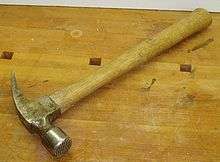Definify.com
Webster 1913 Edition
Hammer
Ham′mer
Ham′mer
,Ham′mer
,Webster 1828 Edition
Hammer
HAM'MER
,HAM'MER
,HAM'MER
,Definition 2025
Hammer
Hammer
English
Noun
Hammer (plural Hammers)
- (soccer) someone connected with West Ham Football Club, as a fan, player, coach etc.
German
Etymology
From Old High German hamar, from Proto-Germanic *hamaraz, from Proto-Indo-European *h₂eḱmoros, from *h₂éḱmō (“stone”). Compare Low German Hamer, Dutch hamer, English hammer, West Frisian hammer, Danish hammer.
Pronunciation
- IPA(key): /ˈhamɐ/
Noun
Hammer m (genitive Hammers, plural Hämmer or Hammer, diminutive Hämmerchen n or Hämmerlein n)
- hammer, mallet
- Er schlug sich mit dem Hammer auf den Daumen.
- He hit his thumb with the hammer.
- Er schlug sich mit dem Hammer auf den Daumen.
- (informal) sensation
- Die Entlassung des Ministers war ein Hammer.
- The minister's dismissal was a sensation.
- Die Entlassung des Ministers war ein Hammer.
- (sports) a hard shot, slam
- Der Torwart parierte einen Hammer von der Strafraumgrenze.
- The keeper saved a hard shot from the 18-yard line.
- Der Torwart parierte einen Hammer von der Strafraumgrenze.
Usage notes
The unchanged plural Hammer is not uncommonly heard for senses 2 and 3. In the concrete sense “hammer”, it would be non-standard.
Declension
Derived terms
|
hammer
hammer
English

Noun
hammer (plural hammers)
- A tool with a heavy head and a handle used for pounding.
- A moving part of a firearm that strikes the firing pin to discharge a gun.
- (anatomy) The malleus, a small bone of the middle ear.
- (music) In a piano or dulcimer, a piece of wood covered in felt that strikes the string.
- (sports) A device made of a heavy steel ball attached to a length of wire, and used for throwing.
- (curling) The last rock in an end.
- (Ultimate Frisbee) A frisbee throwing style in which the disc is held upside-down with a forehand grip and thrown above the head.
- Part of a clock that strikes upon a bell to indicate the hour.
- One who, or that which, smites or shatters.
- St. Augustine was the hammer of heresies.
- J. H. Newman
- He met the stern legionaries [of Rome] who had been the massive iron hammers of the whole earth.
Derived terms
Translations
|
|
|
|
See also
Verb
hammer (third-person singular simple present hammers, present participle hammering, simple past and past participle hammered)
- To strike repeatedly with a hammer, some other implement, the fist, etc.
- To form or forge with a hammer; to shape by beating.
- Dryden
- hammered money
- Dryden
- (figuratively) To emphasize a point repeatedly.
- (sports) To hit particularly hard.
- 2010 December 28, Marc Vesty, “Stoke 0 - 2 Fulham”, in BBC:
- This time the defender was teed up by Andrew Johnson's short free-kick on the edge of the box and Baird hammered his low drive beyond Begovic's outstretched left arm and into the bottom corner, doubling his goal tally for the season and stunning the home crowd.
-
- (cycling, intransitive, slang) To ride very fast.
- 2011, Tim Moore, French Revolutions: Cycling the Tour de France (page 58)
- Fifteen minutes later, leaving a vapour trail of kitchen smells, I hammered into Obterre.
- 2011, Tim Moore, French Revolutions: Cycling the Tour de France (page 58)
- (intransitive) To strike internally, as if hit by a hammer.
- I could hear the engine’s valves hammering once the timing rod was thrown.
- (transitive, figuratively, sports) To defeat (a person, a team) resoundingly
- We hammered them 5-0!
Derived terms
|
|
See also
Translations
|
|
|
|
Danish
Etymology
From Old Norse hamarr, from Proto-Germanic *hamaraz, from Proto-Indo-European *h₂eḱmoros, from *h₂éḱmō (“stone”).
Pronunciation
- IPA(key): /hamər/, [ˈhɑmɐ]
Noun
hammer c (singular definite hammeren, plural indefinite hammere or hamre)
Inflection
German
Pronunciation
- IPA(key): /ˈhamɐ/
- Homophone: Hammer
Verb
hammer
- (colloquial, regional) Contraction of haben wir.
- Da hammer jetz' keine Zeit für.
- We don't have time for that now.
- Da hammer jetz' keine Zeit für.
Usage notes
This contraction is common throughout central Germany, southern Germany, and Austria. It is only occasionally heard in northern Germany.
See also
Norwegian Bokmål
Etymology
From Old Norse hamarr, from Proto-Germanic *hamaraz, from Proto-Indo-European *h₂eḱmoros, from *h₂éḱmō (“stone”).
Alternative forms
- hammar (Nynorsk also)
Noun
hammer m (definite singular hammeren, indefinite plural hammere or hamrer, definite plural hammerne or hamrene)
- a hammer (tool)
Related terms
- hamre (verb)
References
- “hammer” in The Bokmål Dictionary.
West Frisian
Etymology
From Old Frisian hamar, from Proto-Germanic *hamaraz, from Proto-Indo-European *h₂eḱmoros, from *h₂éḱmō (“stone”). Compare English hammer, Low German Hamer, Dutch hamer, German Hammer, Danish hammer.
Noun
hammer